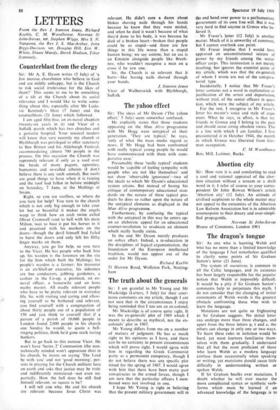The yahoo effect
Sir: The ideas of Mr Dyson (`The yahoo effect,' 5 July) seem somewhat confused.
He explicitly states that those students appearing on the Man Alive programme with Mr Hogg were untypical of their generation. 'They are typical,' he says, `only of what the mass media regard as news. If Mr Hogg had been confronted with really typical young people he would have communicated with them with com- parative ease.'
Presumably these 'really typical' students would be 'capable of feeling sympathy with people who are not like themselves' and not show 'observable ignorance'—two of the ideals to which Mr Dyson's educational system attains. But instead of basing his critique of contemporary educational stan- dards on the nature of these typical pro- ducts he does so rather upon the nature of the untypical elements as displayed in the Man Alive programme.
Furthermore, by confusing the typical with the untypical in this way he enters up- on an elaborate appeal for an educational counter-revolution to eradicate an element which really hardly exists.
In the end Mr Dyson merely produces an oohay effect. Indeed, a re-education in the disciplines of logical argumentation, the foundation of the European intellectual tradition, would not appear out of the order for Mr Dyson.


































 Previous page
Previous page